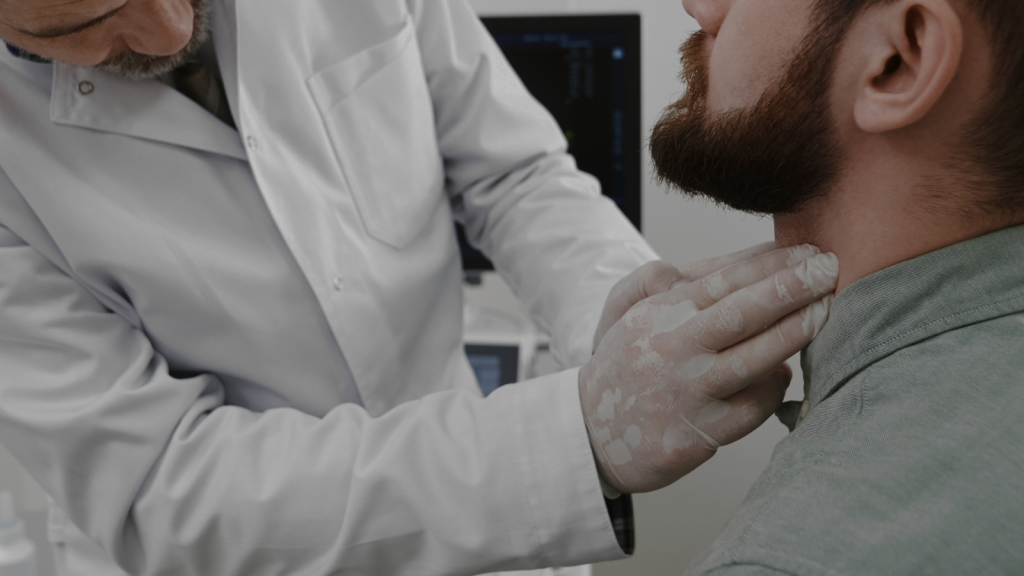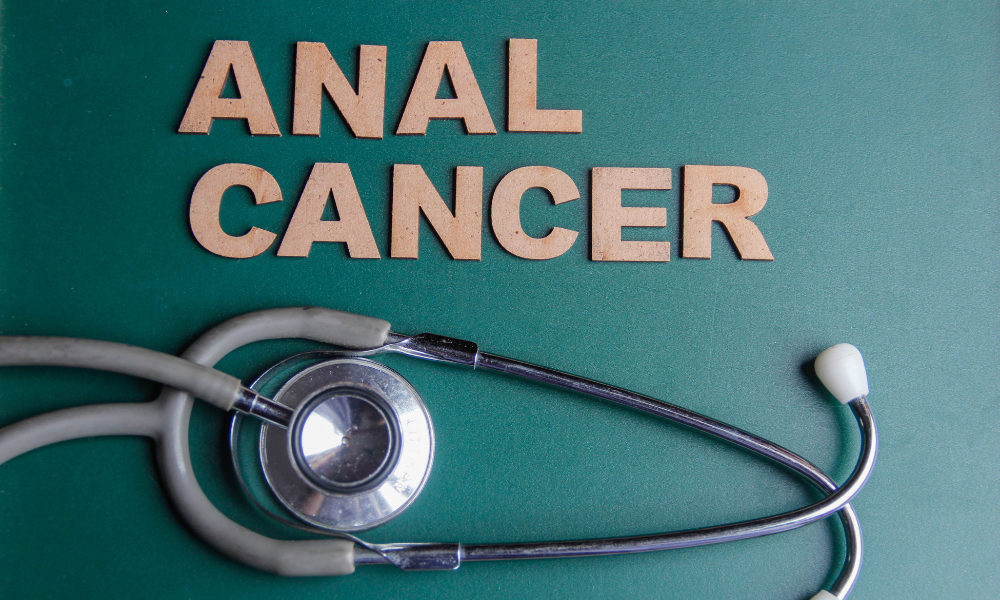HPV
(Human papillomavirus)
and cancer
in men
HPV (human papillomavirus) is the most common sexually transmitted in the United States. It is so common that experts say most sexually active people will get it at some point in their lives.
Most HPV infections clear on their own without causing any health issues. Most people won’t even know they had it.
In some cases, however, HPV can lead to cancer including of the cervix, vulva, vagina, penis, or anus, as well as oropharyngeal cancer (which includes the back of the mouth/base of tongue, throat, and tonsils).

HPV-related cancers in men are not common. Men who have receptive anal sex and those who have HIV may be more likely to likely to develop cancers.
It is estimated that each year there are more than 15,000 cases of HPV-related cancer in men, including:
12,500 cases of cancer of the back of the throat
2,200 cases of anal cancers
900 cases of cancer of the penis
HPV-related cancers in men are not common. Men who have receptive anal sex and those who have HIV may be more likely to likely to develop cancers.
It is estimated that each year there are more than 15,000 cases of HPV-related cancer in men, including:
12,500 cases of cancer of the back of the throat
2,200 cases of anal cancers
900 cases of cancer of the penis
HPV and Cancer
There are over 100 different types of human papillomavirus, some of which are linked to the development of cancer. About 79 million people are thought to have an active HPV infection at any given time. Most of these cases will not lead to cancer—a small number will.
HPV is sexually transmitted and can be contracted by anyone who anyone who has ever had a sexual encounter. You can contract HPV from a partner at one time in your life, it can remain dormant (or “asleep”) for a months or years, and then later be unknowingly transmitted to another sexual partner, including a spouse. This is why it is usually impossible to determine when or from whom HPV may have been contracted.
HPV-Related Cancer in Men
HPV-related cancers in men are not common. Men who have receptive anal sex and those who have HIV may be more likely to likely to develop cancers.
It is estimated that each year there are 12,500 cases of oropharyngeal cancer; 2,200 cases of anal cancers; and 900 cases of cancer of the penis in men that can be attributed to HPV.
Oropharyngeal Cancer
Oropharyngeal cancer includes the area at the back of your mouth, base of your tongue, your throat, and your tonsils. HPV is thought to cause 70% of oropharyngeal cancers in the United States. HPV is typically transmitted to the mouth by oral sex.
Oropharyngeal cancer may cause a persistent sore throat, but many people don’t have any symptoms until the cancer has spread to a nearby lymph node causing it to swell which can look like a growth on the neck. Other symptoms may include:
- trouble chewing
- difficulty swallowing or moving your tongue
- changes in your voice
If you have symptoms, see a health care provider who will likely do a biopsy to determine to check for cancer or pre-cancerous tissues. Treatment for oropharyngeal cancer may include surgery, radiation, and/or chemotherapy.
Research has found that people with oropharyngeal cancers caused by HPV are more easily cured with radiation and chemotherapy than people with tumors not caused by HPV. When caught early, HPV-positive throat cancers have as much can have a five-year survival rate as high as 85-90%.
Expert interview
Dr. Michael Moore Answers Our Questions About HPV and Head and Neck Cancers

Anal Cancer
The anal canal is the short tube at the end of the rectum that stool passes through as it leaves the body. Cancer in this area may appear as a growth or a lump.
Symptoms of anal cancer include:
- bleeding from the anus
- blood in the stool, and pain
- some people may have itching in the anus and feel like they have to go to the bathroom more often
Symptoms of anal cancer are sometimes mistaken for hemorrhoids.
If you have symptoms, see a health care provider who can do a visual examination and digital rectal exam (inserting a gloved finger into the anus and rectum) to feel for growths. If the health care provider finds something, they may use anal cytology (sometimes called an anal pap test) to examine cells under a microscope and look for cancer or precancerous cell changes or lesions.
There is new research to suggest that people at high risk of anal cancer—which includes people living with HIV, those who have compromised immune systems, and people who have had other HPV-related disease—could benefit from anal cytology even if they have no symptoms. Talk to your health care provider if you think you might be at increased risk.

Penile Cancer
Penile cancer can occur anywhere on the penis. It often starts with the cells on the skin but can work its way inside. Most people who get cancer of the penis are over age 55.
Symptoms of penile cancer include:
- a sore that won’t go away
- a lump on your penis
- changes in the thickness or color of skin
- pain or swelling in the penis
- bad smelling discharge under the foreskin
- lumps in your groin.
It is important to see a health care provider if you have any of these symptoms which can also be symptoms of STIs or other health issues. A health care provider will do a visual examination and may do a biopsy to check for cancer or suggest a CT scan or other imaging tests.
If cancer of the penis is caught early it may be treated with a medicated skin cream or cryotherapy, a procedure that “freezes” the cancerous tissue. More advanced cancers may be treated with surgery, chemotherapy, and/or radiation.
Sexual Health After Cancer
It is common for people going through cancer treatment to face sexual health challenges—both physical and emotional. Treatment can affect many aspects of sexual functioning and change the way you feel about your body. This may make it harder to enjoy sexual pleasure and intimacy.
Cancer treatment can also cause changes in your relationship as you and your partner are likely both dealing with strong emotions such as anger, anxiety, and uncertainty. In addition, you are both handling the disruption to your normal routines whether that means frequent medical appointments or side effects that make it hard for you to do things from household chores to outside fun.
If you don’t have a partner, cancer treatment and the side effects will likely have a significant impact on your dating life at least in the short-term.
For some people with cancer, sex is the last thing on their mind. That’s okay, but sexuality and intimacy are important to your overall health, well-being, and relationships. Being open and honest with your partner(s)—and yourself—is important.
Fertility Concerns
Certain cancer treatments—including some chemotherapy and radiation therapy—can affect sperm production even after treatment has ended. If you think you might want to have children in the future, talk to your cancer care team about the possibility of banking sperm before you start treatment.
Possible Sexual Side Effects
Treatment for HPV-related cancers—whether surgery, radiation, or chemotherapy—can cause physical changes that may impact sex and pleasure. Chemotherapy and radiation may make you feel fatigued and generally unwell. Head and neck surgeries may lead to a lack of sensation in your mouth or tongue. Surgical treatment of penile cancer may dramatically change how your penis functions. While some of these changes are likely temporary, others may be long lasting.
Talk with your cancer care team about what you can expect from your specific treatment and share this information with your partner. Staying intimate and connected to a partner during this time is important, but what you do together may change. Remember, intimacy does not require penetration or orgasm (you could just spend a lot of time cuddling).
Concerns About Your Partner’s Health
Many people going through chemo or radiation are concerned that their partner may be exposed to the strong chemicals involved in their treatment. Your health care provider knows the exact treatment you are getting and can answer questions you have about any risk to your partner. Experts often suggest using condoms when you have sex during treatment to be safe.
Oropharyngeal, anal, and penile cancers are not contagious, but HPV is a highly contagious STI. It’s so contagious, that most sexually active people will get HPV at some point in their life. For most people the infection will go away on its own without them ever knowing they’ve had it. If you’ve been with your partner for a while, it is likely that they’ve already been exposed to any HPV you have so using condoms for this purpose is not necessary.
There are no routine screening tests HPV in men. If your partner is worried about having been exposed through anal sex, they can ask about getting anal cytology (a test similar to a Pap smear). If your partner is worried about having been exposed through vaginal sex and hasn’t had an HPV test and Pap smear recently, they should talk to a provider about those tests.
Your partner could also consider getting the HPV vaccine if they have not already been vaccinated. The HPV vaccine is currently only recommended for those age 45 or younger but your partner can talk to their health care provider about the possibility of getting it at an older age given the circumstances.
Be Honest
Cancer treatment can make you feel not like yourself. This can come from the physical symptoms like nausea or fatigue, psychological issues like anxiety or loss of self-esteem, and the emotional weight of not knowing what will come next. All of this takes a toll on you and your partner.
Being open and honest with your partner can help take some of the pressure off. If you’re not up for sex, you can say that. If you’re interested, but scared it might hurt, say that. Ask your partner what they are feeling as well and give them permission to be honest. Staying connecting is important, but when it comes to sex, neither of you ever has to do anything you don’t want to do.
Hear the Stories of Cancer Survivors
American Sexual Health Association
ASHA believes that all people have the right to the information and services that will help them to have optimum sexual health. We envision a time when stigma is no longer associated with sexual health and our nation is united in its belief that sexuality is a normal, healthy, and positive aspect of human life.
FOLLOW US
ABOUT
GET INVOLVED
ASHA WEBSITES
GET HELP
© 2024 American Sexual Health Association